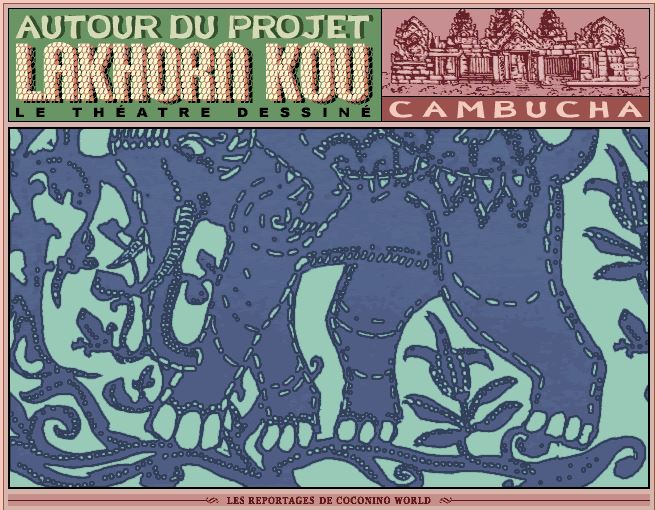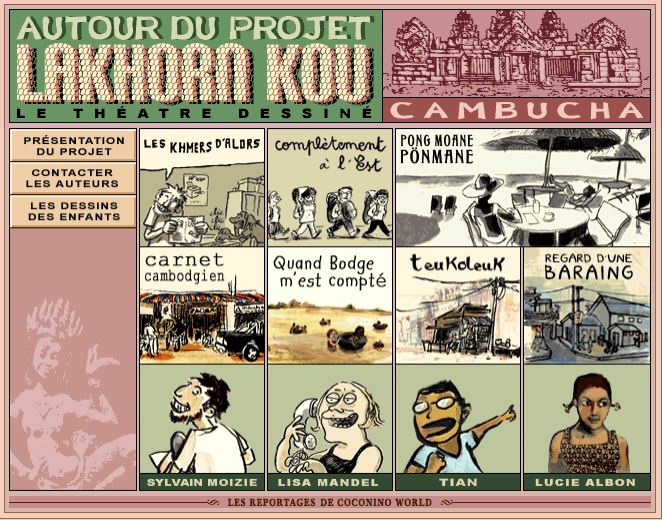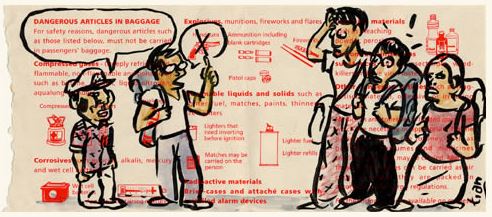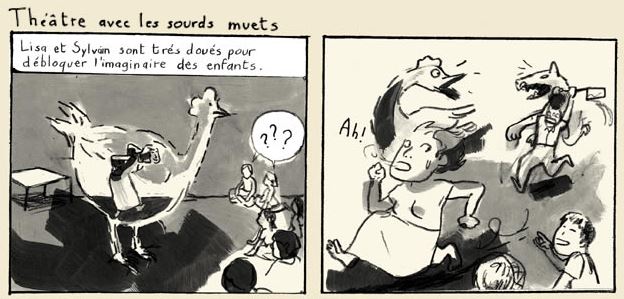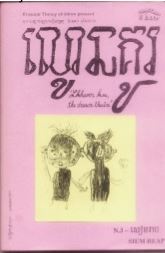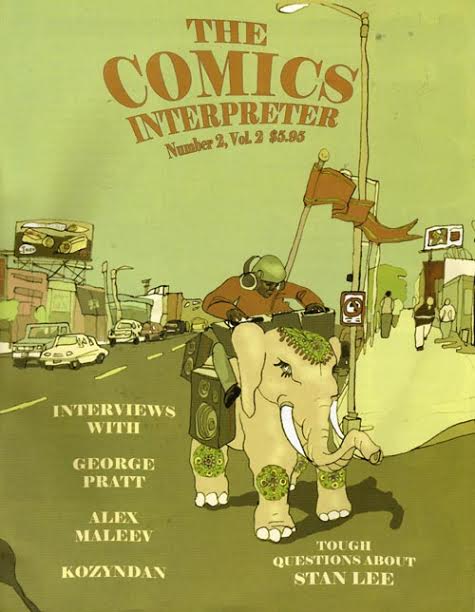sylulitian Interview – originally printed in The Comics Interpreter, Volume 2, Issue #2.
The Krousar Thmey (New Family) organization is fortunate to be situated on the road to Cambodia’s biggest tourist draw, Angkor Wat. If you take a look at their visitors center, you’ll find some innovative efforts to aid children who have disabilities and disadvantages.
One of these in particular is small, photocopied publication, called Lakhaorn Kou – “Drawn Theatre”. Published in English and Khmer, it is the product of an innovative drawing class by four French comic artists: Lisa Mandel, Tian Keu, Sylvain-Mozie Rondet, and Lucie Albon from Ecole Superieure des Arts Decoratifs de Strasbourg (France).
Interview by John Weeks, with facilitation/translation/
How did you come to Cambodia?
Tian: I wanted to return to Cambodia to do something and the idea is still in process. In the time of my study, I met some friends that helped me with their enthusiasm, their motivation with a project that consisted of publishing illustrated journals with Cambodian children. So, we found a center called Krousar Thmey, which allowed us, for seven months to work with these kids here.
Essentially, we concentrated on handicapped children, we wanted to orient ourselves towards them because they have problems with speaking and we could help try to find a means of expression for them that could expand a lot larger.
Lisa: We worked with the children without family at the protection center of Krousar Thmey and it was deaf children. It was a very important part of our work, the work with the children was no problem. No physical problem, it [being physical] was too a very big part because those children have no way of expression, they know how to speak they can’t hear, something is closed inside, and we try to open that up in them.
Did they change after the workshop?
Lisa: Yes, really, because we asked them to play theater. You could see that they were more open. Now they can imagine more than before, they have found a trust, a certain self-confidence.
Tian: We conducted workshops in two different provinces, Battambang and Siem Reap, to more effectively enlarge our goals, what we wanted to do. We divided ourselves in two, Lisa and Sylvain and Lucie and me. We worked for three months in each province, and then we changed. The point to add is that Lisa and Sylvain do not have the same speciality of study as we (Lucie and me) do. They are specialized in theater, in corporeal expression, which gives another dimension, this is why we changed from one province to another to complete the goals of the workshop.
Can you speak more about your specialities?
Tian: For Lucie and I, our specialities are more based on expression of plastic arts, all the technical forms of drawing and design. We teach them many diverse techniques, and we work on shadow puppets, fundamental classic design, all that is related to the expression of the plastic arts.
Lucie: I would like to add some more techniques we developed with them: teaching, editing, ….. and Lisa and Sylvain continued along these lines. Basically we were there to help provide a base, to provide the grounds for more exploration and accentuated expression.
Lisa: Sylvain and I used to work a lot with theater. Just expression of feelings with stories, and we approached the children in this way, we took care of the graphic design. We really want to work with them to make them express what they have in their heads. This is what was most important for us because we knew of that after beginning, they made a lot of graphism and different explorations from drawing.
So you have proposed this workshop and now you go home in two days. This has changed the children a bit, has this changed your ideas?
Tian: What struck me was that in one province to another, from one class to another, all the children were different. We thus had to adapt to make the children understand what we wanted them to do. So, in each time, we had the main theme for each class, but not the same way of teaching the class. So for us, it was such a learning experience because we had to face these difficulties of understanding, be creative to get our message across, it pushed us to perfect and improve our teaching.
Lisa: Personally, the most difficult thing I encountered was that the children have no reference. It means that in Europe, in America, in occidental places, we see pictures everywhere. We don’t realize that but we have a lot of references. But for these children they know nothing, they know cows, houses, they know cars, they know motos, and when you ask them to imagine something, it’s very hard for them.
For us it is so easy, we are in a different role, we know a lot of comic strips, and we can mix everything in our brain, and express something different. For them it is very difficult, and it is the most difficult thing, to teach them how to imagine, and the problem is that a lot of them have lived very hard things before, and it’s hard for someone with such problems to find solutions for living their own life. It is very difficult for them, these children, to forget all the problems and to be funny, carefree.
Sylvain: We wanted them to try to express things that are not just a part of their everyday reality. Even with the problems they have in their own life, to find something else, to find something very deep, to express something with their life. Outside the first story of I eat, I go to work, I come back, I eat, I sleep.
This is their first story, their daily life. We wanted to introduce to them animals that could speak, different things, and try to push these things so it doesn’t just have to be just I eat, I sleep. This was the most difficult thing to try breaking a bit every child, every particular circumstance of what can happen in their life. Invent other circumstances to break out of the everyday world they live of in “I go out, I eat, I sleep”.
Sylvain: With the deaf children, we worked two hours a week, every week, and we could see progress, evolution. In Battambang, we had a somewhat different arrangement. There were kids preparing for an exhibition, so we were giving classes four times a week for two hours each session, so it was different. We could see the progress even faster, so it takes time.
Lucie: For me, what was really different from the courses that I finished in France, was that the kids were hyper-attentive. They were so calm, something I have never seen, especially because in France most of our energy in teaching is to keep the attention of the children. Here, we can go much farther.
Sylvain: They are too [distracted?] in France.
Lucie: Yes, and here, we came to realize how quickly we can progress. This is why we saw such fast progress. It was them that helped us to advance so quickly. They ate all that we taught them, they remembered everything, looking in their dictionaries every time…
Sylvain: It was really remarkable that they could remember so much. After we worked on expressions of face, expression of the body, this served to help start creating the stories. It is in this method as well that enables us to advance very fast.
Lisa: The children are consumers. They consume so they propose millions of activities. There is such high interest. They do not know, they want to know what it is, so in my experience it becomes a lot easier on the level of working with simple children, because there is everything to open, they ask everything, they come to us on the weekends, after they come to our houses or at the center for drawing more, it is incredible. Really, in France, we just don’t see this kind of enthusiasm.
Lucie: And it’s not just one student like this, but the whole class. I think that drawing classes are not taught in schools here, so this could play a role in why they are so eager to learn. It’s new and and it provides a chance for them.
What will the future be for workshops, classes like this? Will there be another class?
Lisa: We phoned some contacts with our school and in Cambodia and maybe we’re going to continue this work but in a more professional way. Yes, really to give the children or the students the possibility to work with real knowledge and something more professional, this is for Sylvain and I, but for Tian it is something different, he can explain.
Tian: I want to explain that at the end of this project, I wanted to explain to the teachers that the interest in this project was not to force the children to go into comics, to make books. The interest and goal of this project was not to have them draw comics as a career. What was important that we try to do for the children was [develop] ideas, the imagination, so that when they grow up and they have to make choices in their lives and what they want to do, they will be enabled to choose better and live that choice intensely. This was the most important thing we wanted to provide at the end of this project.
Lucie: What will happen with us at the end of this project is an exhibition in France. If it is successful, we will try to tour it here in Cambodia. I don’t know if it is possible, but it is also wanting to better know and teach the children in France, [and] ex-pat Khmers so that they can better know their country…
Sylvain: We also have started a parallel project that will tour every seven months. It’s a project that involves each of us telling his experience in the form of comic strips, in the duration of the whole seven months. Our goal in France is to realize a book, or many books to expose all the different approaches of telling about and expressing this journey.
Can you tell us more about the publishing project Soft Comics?
Sylvain: Soft Comics is a little association that publishes comic books that started two years ago. The association started with the aim of promoting young authors in starting a small publication. The people that helped start it consisted of people we also met at the Strasbourg school. Right now, the project is taking a slightly different turn because we are all occupied with our own work, everybody is starting to get their own contacts, right and left.
However, having this association on the side allows us to explore certain things in publishing comic strips that could not be published in other places otherwise or accepted. So this is what I started up with some friends, with Antienne that had helped with the first publication. Lisa will help integrate the association with a monthy magazine, that is a magazine of promoting comic strips next to Soft Comics. Lucie also is part of another association but in the same domain of interest and publication.
syvain. lucie, lisa, and tian can be reached via sylulitian@hotmail.com
Their comics and drawings “7 Mois Au Cambodge” [7 Months in Cambodia] can be seen at
http://www.old-coconino.com/sites_auteurs/lakhorn_kou/lak_menu.htm
‘Institut Pacome’ has published a number of works by these cartoonists. http://institutpacome.free.fr/
Sylvain-Moizie and Lisa Mandel returned to teach at Phare Ponleu Selpak:
http://www.qdcomic.com/battambang/
http://www.qdcomic.com/battambang/kami-shibai/index2.html
http://www.qdcomic.com/blog/2005/07/beaucoup-des-bd.html
http://jinja.apsara.org/2005/08/phare-comics-workshop-2005/
http://jinja.apsara.org/2005/08/whats-cooking-at-phare-art-school/
